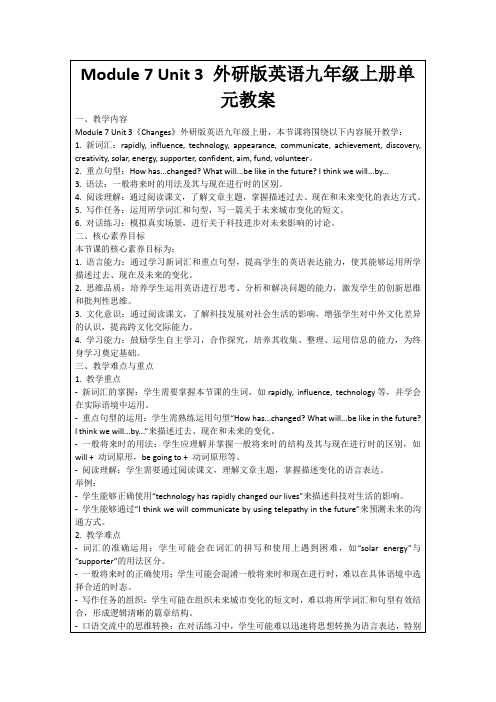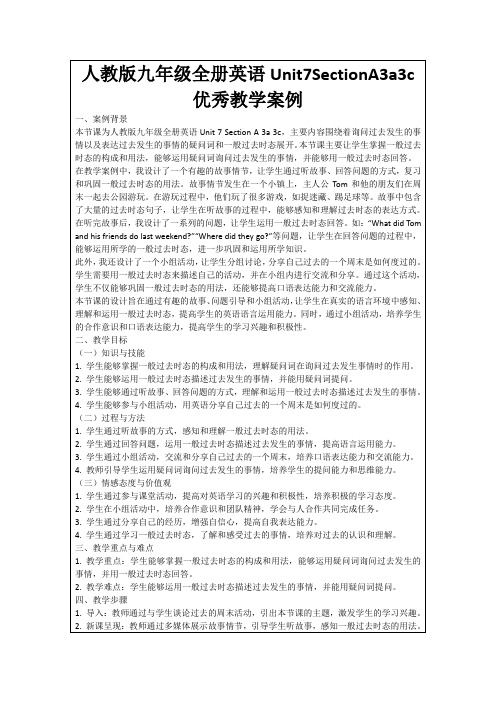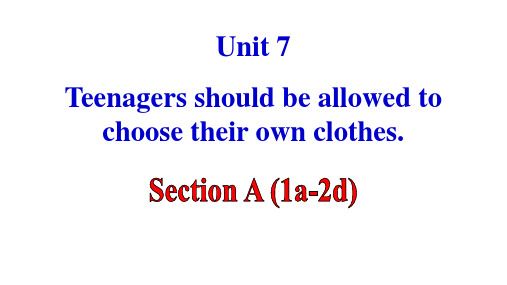九年级Unit7--3
外研版九年级下册英语Module7Unit3部分课文翻译

外研版九年级下册英语Module7Unit3部分课文翻译在外研版九年级下册英语Module7 Unit3的课程即将到来,同学们要掌握哪些部分课文翻译呢?接下来是店铺为大家带来的关于外研版九年级下册英语Module7 Unit3部分课文翻译,希望会给大家带来帮助。
外研版九年级下册英语Module7 Unit3部分课文翻译(一) Language practice语言练习lt's also the subject that l'm best at,although my spoken English is not that good.它也是我最擅长的科目,尽管我的英语口语不是那么好。
I can speak English with you whenever we meet.无论何时我们见面,我都能和你说英语。
As China continues to grow, many people thinkthat Chinese will become as common as English by the middle of the twenty-first century.随着中国的不断壮大,很多人认为,到21世纪中期,汉语将会变得和英语一样普遍。
I hope I can continue to make progress next year.我希望明年能继续取得进步。
The British, the Indians and the Chinese all help(to) make it a rich language.英国人、印度人和中国人共同将英语变成了一门丰富的语言。
Complete the sentences with the words or expressions in the box. There may be more than one answer.用方框中的单词或短语完成句子。
外研版九年级下册英语Module7Unit3课文翻译(2)

外研版九年级下册英语Module7Unit3课文翻译(2)外研版九年级下册英语Module7 Unit3课文翻译(三)Teacher:Before we start the lesson, everyone,is there anything you're worried about or need help with?老师:同学们,在我们上课之前,你们有担心或者需要帮忙的事吗?Student A:Yes,l'm worried about my handwriting,because it isn't good.学生A:是的,我担心书写,因为它不好。
Teacher:Gcod handwriting (1)___ (recluire)a lot of practice. You need (2)___ (practise) writing the letters and joining them together.0”you work hard,you can (3)___(improve)hIs there anyone else with a problem?老师:好的书写(1)___需要多加练习。
你需要(2)___练习写字母并把它们拼接在一起。
如果你努力练习的话,你会(3)___提高的。
还有其他人有问题吗?Student B:l want (4)___(achieve) higher marks in spelling. lt's so. difficult!学生B:我想在拼写方面(4)___取得更嵩的分数。
这太难了!Teacher: Yes, English spelling is difficult. You need to have a good knowledge of the way that words are (5) (write).For example,remember that the word "letter" has double "t" in if.老师:是的,英语拼写很难。
人教版九年级全册英语Unit7SectionA3a3c教学设计

(4)针对不同层次的学生,实施差异化教学,关注每个学生的学习需求,提高他们的自信心。
3.教学评价:
(1)采用多元化的评价方式,如课堂表现、小组合作、课后作业等,全面评估学生的学习效果。
(2)关注学生的情感态度,通过课堂观察、交流谈话,了解学生的学习需求和情感变化,及时调整教学策略。
注意事项:
1.作业难度要适中,确保学生能够在课后独立完成。
2.作业量要适宜,避免给学生造成过重的负担。
3.鼓励学生在完成作业时,尽量运用所学知识,发挥自己的想象力。
4.教师在批改作业时,要给予积极的评价和鼓励,关注学生的进步,提高他们的学习积极性。
3.教师针对学生的练习情况,给予及时反馈和指导,帮助学生纠正错误,提高语言运用能力。
(五)总结归纳
1.教师引导学生回顾本节课所学的核心词汇、短语、句型和一般过去时态的用法。
2.学生分享学习收获和感悟,总结成功人士的品质和经历对自己的启示。
3.教师强调团队合作的重要性,鼓励学生在今后的学习生活中,积极面对困难,勇往直前。
(3)鼓励学生自我评价和互相评价,培养他们的自主学习能力和批判性思维。
四、教学内容与过程
(一)导入新课
1.教师通过向学生展示一些著名人物的图片,如马云、乔布斯等,引导学生思考这些人物的成功秘诀和经历。
2.邀请学生分享自己崇拜的人物及其原因,激发学生对本章节话题的兴趣。
3.教师提出问题:“What qualities do you think a successful person should have?”,让学生进行头脑风暴,列出成功人士所需的品质。
2.口语作业:学生分组,每组选择一个成功人士,进行角色扮演,模拟真实场景,用英语进行对话。要求对话内容涵盖该人物的经历、成就和品质。
新 外研版英语九年级下Module 7 Unit 3 Language in use练习(附答案)

Unit 3 Language in useⅠ.用括号内所给单词的适当形式填空1.I'm sure China will be able ________(hold) the Winter Olympic Games successfully in 2022. 2.Little Tom ate at ________(little) 4 ice creams, and soon he felt terrible.3.Staying with a British family is a good way ________(learn) about British culture.4.She made a good study plan at the ________(begin) of the new term.5.He lost his key. It made him ________(stay) in the cold to wait for his wife's return. Ⅱ.用所给单词或短语的适当形式填空last, provide, try out, grow up,make great progress6.What are you going to be when you ____________________?7.Edison always ____________ his new ideas when he was young.8.He kept studying hard on the Internet at home and ____________ soon.9.The government has ____________ children in poor areas with food for free since 2011. 10.The heavy rain ____________ for a long time yesterday.Ⅲ.单项填空( )11.The restaurant is nice and the food is not bad, ________ I still prefer eating at home. A.and B.butC.so D.or( )12. You'd better ________ your sweater when you go out. It's cold outside.A.wear B.to wearC.put on D.to put on( )13.Some girls get sick after they try so hard to lose ________.A.weighing B.weightC.weigh D.weighed( )14.—I'm sorry I ________ my exercise book at home this morning.—It doesn't matter. Don't forget ________ it here this afternoon.A.left; to take B.forgot; bringingC.left; to bring D.forgot; to bring( )15. ________ my sister ________ my brother sings well. Because they are both music teachers. A.Both; and B.Not only; but alsoC.Either; or D.Neither; norⅣ.根据首字母提示完成短文My mother likes shopping every day. She is 16.c________ about it. She often makes a shopping 17.l________ at the beginning of every month. The things include shorts, trousers, some pairs of sunglasses and so on. At the 18.s________ time, she often stays in 19.t________ with her friends in other countries. Different countries have different 20.c________, so they often talk about shopping experiences and different customs online. Sometimes she invites some foreign 21.g________ to our home. They have formed close 22.f________ with each other.Compared to going to the supermarket, my mother 23.p________ shopping online. She says that it can save(节省) her 24.m________ money and time. She has lots of other things to do in her 25.d________ life.Ⅴ.任务型阅读In the past, when students graduated(毕业) from college and got jobs, only some of them went on with their study. But today, lifelong(终身的) learning is becoming more and more common.Lucy, who is forty, teaches physics at a college in Boston. “Next term, I'll teach some of my classes by using the Internet. This is the way of teaching that I've never used before,” says Lucy. “These days, I am taking a class on the Internet to learn about the computer. If not, I will lose my job.” At the same time, Lucy's seventyyearold parents, who live in New York, are taking an art class online. “We love this subject,” says her father, “and we learn it to enjoy ourselves. You see we can study with people all over the world. What fun it is to learn like this!”根据短文内容,完成表格。
人教目标九年级全一册英语:Unit 7 Section A(3a-3c) 课件(共33张PPT)

all night,
his mom sang to him and stayed by his side.
When he was two _r_u_n_n_in__g_ _th__ro_u_g__h_ _th__e_ _f_ie__ld__
,
she made sure he was safe and kept him from danger.
field
5. 举起,抬高
lift
7. awful 很坏的,讨厌的
9. regret 感到遗憾,懊悔
2. 哭,哭喊 cry . 4.拥抱,搂抱 hug . 6. 严重的,差 badly .
8.teen 13-19岁之间的年轻人. 10. poem 诗,韵文 .
2.短语互译
1.一个幼小的婴儿
a tiny baby
running through
made sure ,kept from
fell and hurt
gave me hug and lifted me up
Read Part2 and Role-play!
There is no ice-cream for you . You’re ill.
I should be allowed to eat some! Give it to me!
But he _t_a_lk_e__d_ _b_a_c_k__ l_o_u_d_ly__
.
He
_re_g_r_e_t_s_ talking back, not listening to Mom because he
thinks Mom knows best, and for him she wanted only the
Module7Unit3外研版英语九年级上册单元教案

实践活动环节,分组讨论和成果展示进行得相当顺利。学生们在讨论中积极发表自己的见解,但在写作练习中,我发现部分学生在组织语言和表达思想方面还存在困难。为了提高他们的写作能力,我打算在下一节课中增加一些关于如何构建文章框架的指导。
-教师可以通过设置具体情境和提供关键词,帮助学生克服口语交流中的思维转换难题,例如,讨论“how technology might affect education in the next 10 years”。
四、教学流程
(一)导入新课(用时5分钟)
同学们,今天我们将要学习的是Module 7 Unit 3《Changes》这一章节。在开始之前,我想先问大家一个问题:“你们在日常生活中是否注意到了科技带来的变化?”比如,我们现在可以通过手机进行视频通话,这在以前是不可想象的。这个问题与我们将要学习的内容密切相关。通过这个问题,我希望能够引起大家的兴趣和好奇心,让我们一同探索科技进步对生活的影响。
五、教学反思
在今天的教学中,我发现学生们对Module 7 Unit 3《Changes》的学习表现出很高的热情。他们在讨论科技对生活的影响时,提出了很多有见地的观点,这让我感到很欣慰。但同时,我也注意到一些需要改进的地方。
在导入新课环节,通过提问的方式引发学生对科技进步的兴趣,这个方法效果不错,学生们都积极参与其中。然而,我意识到在引导学生们思考问题时,可以更加具体和深入,以便让他们更好地将问题与即将学习的内容联系起来。
2.教学难点
-词汇的准确运用:学生可能会在词汇的拼写和使用上遇到困难,如“solar energy”与“supporter”的用法区分。
人教版九年级英语unit7SectionA2(3a3c)教学设计

1.通过小组合作学习,培养学生的团队协作能力和沟通能力。
2.运用任务型教学法,引导学生参与课堂活动,提高学生的英语实际运用能力。
3.采用情境教学法,让学生在真实的语境中学习英语,提高学习兴趣。
4.利用多媒体教学资源,如图片、视频等,激发学生的学习兴趣,帮助学生更好地理解课文内容。
(三)情感态度与价值观
作业要求:
1.学生要认真完成作业,确保作业质量。
2.家长要关注学生的学习进度,给予鼓励和支持。
3.教师要及时批改作业,了解学生的学习情况,为下一节课的教学做好准备。
2.学会使用一般过去时态描述过去发生的事情,如:She had an operation two months ago.(她两个月前做了手术。)
3.能够理解并运用目标句型:“How did sb. do…?”和“How was sb. doing…?”来询问某人过去做某事的情况。
4.提高阅读理解能力,通过阅读课文,了解并掌握关于癌症患者的治疗和康复过程。
教学目的:激发学生的同情心,为学习新课做情感铺垫。
2.课堂讨论:观看视频后,教师提出问题,如:“What do you know about cancer? Can you share some stories about cancer survivors?”引导学生分享所了解的癌症知识和抗癌故事。
解决策略:采用问题链、思维导图等方法,引导学生深入理解课文,提高阅读效果。
(二)教学设想
1.导入:通过播放关于癌症患者的视频,引导学生关注癌症患者的治疗和康复过程,激发学生的同情心和兴趣。
2.课文学习:采用任务型教学法,将学生分为小组,完成相应的阅读任务。在任务完成过程中,引导学生关注重点词汇和语法点。
外研版九年级英语上册Module 7 Unit 3

5.被动语态的用法 一般说来,有下面几种情况需用被动语态:
4. The teacher usually __g_i_v_e_s_____ the students a lot of ideas. The students ___a_r_e___ usually __g_i_v_en___ a lot of ideas by the teacher.
2. Complete the passage with the correct form of the words and expression in the brackets.
Host: Is that a problem? James: Yes, I think so. Although it’s good that everyone
can be a writer and write what they like on the Internet, they also write wrong information. So it isn’t (4)___w_i_se___ to get all your information from the Internet.
feels quite bad. But soon he turns the situation round, and he (4)_i_s_h_e_l_p_e_d_ (help) by his friends instead. Tom says that he enjoys painting the gate white, and his friends want to try. He asks each friend to give him something valuable, and in return they (5)_a_r_e_a_l_lo_w__ed__ (allow) to do some of Tom's work!
人教版九年级英语unit3知识内容

人教版九年级英语unit3知识内容我们全都要从前辈和同辈学习到一些东西。
就连最大的天才,如果想单凭他所特有的内在自我去对付一切,他也决不会有多大成就。
下面给大家带来一些关于人教版九年级英语unit3知识内容,希望对大家有所帮助。
一.Unit3单词restroom [?restru:m] n.(美)洗手间;公共厕所stamp [st?mp] n. 邮票;印章bookstore [?bukst?:(r)] n. 书店beside[b??sa?d] prep. 在……旁边;在……附近postcard [?p?ustka:(r)d] n. 明信片pardon [?pa:(r)dn] v. 原谅 interj.请再说一遍 washroom [?w??ru:m] n. 洗手间;厕所 bathroom [?bɑ:θru:m] n. 浴室;洗手间 normally ['n?:rm?li] adv.通常;正常情况下 rush [r??] v. & n. 仓促;急促 suggest [s??d?est] v. 建议;提议 pass by 路过;经过 staff [sta:f] n. 管理人员;职工 grape [greip] n. 葡萄central [?sentr?l] adj. 中心的;中央的Nearby [?n?r?ba?] adj.附近的;邻近的 adv.在附近;附近 Pardon me 抱歉, 对不起;什么,请再说一遍 mail [meil] v. 邮寄;发电子邮件 n. 邮件 east [i:st] adj. 东方的;东部的adv.向东;n.东方 fascinating [?f?sineiti?] adj.迷人的;有吸引力的.Inexpensive[??n?k?spens?v] adj.不昂贵的Uncrowded [?n?kra?d?d] adj.不拥挤的;人少的convenient [k?n?vi:ni?nt] adj. 便利的;方便的 mall [m?:l] n. 商场;购物中心 clerk [kla:k][kl:rk] n. 职员corner [?k?:(r)n?(r)] n. 拐角;角落politely [p??laitli] adv. 礼貌地;客气地request [ri?kwest] n. 要求;请求direction [di?rek?n] [dai?rek?n] n. 方向;方位 correct [k??rekt] adj. 正确的;恰当的 polite [p??lait] adj. 有礼貌的;客气的 . direct [di?rekt, dai?rekt] adj. 直接的;直率的.speaker [?spi:k?] n.讲(某种语言)的人;发言者 whom [hu:m] pron. 谁;什么人 impolite [??mp??la?t] adj. 不礼貌的;粗鲁的address [??dres], [??dres] n.住址;地址;通讯处.Underground [??nd?ɡra?nd] adj.地下的;n.地铁 Parking lot n.停车场 course [k?:(r)s] n. 课程;学科 Italian [I?t?li ?n] adj.意大利\人的;n.意大利人\语 Tim [tim] 蒂姆(男名)二.Unit3知识梳理【重点短语】1.a pair of 一对,一双,一副2.between A and B 在a和b之间3.on one’s / the way to 在去……的路上4.pardon me 什么,请再说一遍5.pass by 路过经过6.look forward to 盼望期待7.excuse me 打扰了请原谅8.get some information about 获取有关……的一些信息9.turn left\right 向左\向右转10.go past 经过路过11.a little earlier 早一点儿12.a good place to eat 一个吃饭的好地方13.in different situation 在不同的情况下14.on time 准时按时15.get to 到达16.have dinner 吃晚餐17.on one’s / \the right在右边e on 快点请过来19.the shopping center 购物中心20.the corner of....... 的角落/拐角处21.lead into 导入,引入【重点句型】1.问路常用的句子:①Do you know where is … ?②Can you tell me how can I get to …?③Could you tell me how to get to …?④Could/Will/Would you please tell me sth. 表示十分客气地询问事情Could you tell me how to get to the park?请你告诉我怎么才能去邮局好吗?2. decide to do 决定做…...She decided to go to have lunch. 她决定去吃午餐。
Unit 7 Section A(3a-3c)九年级英语全册(人教版)

Read the poem aloud and say what’s the meaning of each part
Part 1
enjoy mother's love
Part 2
be tired of mother's love
Part 3
unerstand mother's love
Part 1:
side.当我还是一个整夜哭闹的小婴儿时,妈妈给我唱歌,陪伴在我身 边。
(1)tiny (very small in size or amount) adj. 意为“极小的;微小的”。 e.g. The baby put his tiny hand in mine.那个婴儿把小手放在我的手中。
( 2 ) cry 此处用作不及物动词,意为“哭、 叫喊”。
What does the title mean? Do you agree with it?
The title means that a mother always knows best for a child, even though the child may disagree with the mother.
Read and match . Part1 Be tired of mother’s love
Part2 Think back to mother’s love Part3 Enjoy motheoem aloud and discuss what the title means with your partner.
running through the field made sure safety ,kept from
fell and hurt
人教版英语九年级全册Unit7单元教学设计

一、教学目标
(一)知识与技能
在本章节的学习中,学生将掌握以下知识与技能:
1.掌握本单元的词汇和重点短语,如:cope with, stress, pressure, perform, communicate, confident, achieve等,并能熟练运用这些词汇进行表达。
2.阅读理解:阅读一篇关于应对压力的英文文章,并完成相关的阅读理解题目。旨在提高学生的阅读速度和理解能力,同时拓宽他们的知识视野。
3.写作练习:根据本节课学习的主题,结合自己的准确性。
4.小组活动:分组讨论生活中遇到的压力及应对方法,每组整理出一份应对压力的建议清单,并在下节课上进行分享。
2.对于阅读理解,通过预读、精读、讨论等环节,逐步提高学生的阅读技巧和理解能力。同时,结合课文内容,引入相关文化背景的介绍,拓宽学生的知识视野。
3.在写作教学中,采用过程写作法,指导学生从构思、草稿、修改到定稿的全过程。注重培养学生的批判性思维,鼓励他们相互评价、提出建议,提高写作质量。
4.教学过程中,关注学生的情感需求,及时给予鼓励和支持,帮助他们建立自信,克服学习中的困难。
2.小组分享:每个小组选代表进行分享,其他小组成员可补充发言。教师对每个小组的讨论进行点评,给予鼓励和建议。
3.角色扮演:让学生根据小组讨论的结果,编写一个关于应对压力的情景剧,并进行表演。其他学生观看后,给出评价和建议。
(四)课堂练习
1.词汇练习:设计填空、选择、匹配等练习题,让学生巩固新学的词汇和句型。
三、教学重难点和教学设想
(一)教学重难点
1.重点:本章节的重点在于词汇和句型的掌握,以及在实际语境中的运用。特别是如何运用所学表达个人在压力下的情感和应对策略。
人教版九年级全册英语Unit7SectionA3a3c优秀教学案例

4.教师引导学生运用疑问词询问过去发生的事情,培养学生的提问能力和思维能力。
(三)情感态度与价值观
1.学生通过参与课堂活动,提高对英语学习的兴趣和积极性,培养积极的学习态度。
2.学生在小组活动中,培养合作意识和团队精神,学会与人合作共同完成任务。
2.学生能够运用一般过去时态描述过去发生的事情,并能用疑问词提问。
3.学生能够通过听故事、回答问题的方式,理解和运用一般过去时态描述过去发生的事情。
4.学生能够参与小组活动,用英语分享自己过去的一个周末是如何度过的。
(二)过程与方法
1.学生通过听故事的方式,感知和理解一般过去时态的用法。
2.学生通过回答问题,运用一般过去时态描述过去发生的事情,提高语言运用能力。
四、教学内容与过程
(一)导入新课
1.教师以一张自己过去的照片为引子,与学生谈论过去的事情,激发学生对过去时态的兴趣。
2.教师提问学生:“Can you guess what I was doing in the picture?”,引导学生用一般过去时态回答。
3.教师总结并引入本节课的主题:“一般过去时态”,激发学生对学习一般过去时态的兴趣。
(三)学生小组讨论
1.教师设计一系列问题,引导学生运用一般过去时态回答,并组织学生进行小组讨论。
2.学生分组讨论,分享自己的过去经历,运用一般过去时态描述,培养学生的口语表达能力和交流能力。
3.教师在小组活动中引导学生互相提问,运用疑问词询问过去发生的事情,培养学生的交流能力和语言运用能力。
(四)总结归纳
3.教师引导学生阅读相关的英语文章或故事,让学生进一步了解和感受过去的事情,培养学生的阅读能力和思维能力。
unit 7 知识点详解及练习 人教版英语九年级全册

Unit7 Teenagers should be allowed to choose their own clothes.1.agree /ə’gri:/ v. 同意,赞成[反义词disagree]练习:(1) --I think students should have mobile phones to call their parents.--_____. They often use them to play games instead.A.I hope soB. I don’t agreeC. No problemD. Good idea(2) --Peter shouldn’t wear that earring.--________. I like it. It looks cool.A. I think soB. I agreeC. I disagreeD. I hope so(3) --I think drinking milk every morning is good for our health.--Yes. I agree ____ you.A. toB. withC. onD. for2. I don’t think 我认为...不...A. will sheB. won’t sheC. don’t youD. do you(2) 翻译:我认为明天不会下雨。
____________________________________________________(3) 翻译:我们原以为你不会来的。
____________________________________________________3. get sth done 让某事被做(1) Thailand got some famous buildings ______ (destroy) in the flood.(2) --Tom, why are you in such a hurry?--Oh, my bike is broken. I’m going to have it ____.A. repairingB. repairedC. to repair4. allow /ə’laʊ/ v.准许,允许(1) The little girl was crying because her mother didn’t allow her ____ the ice-cream.A. eatB. eatsC. to eatD. ate(2) The teacher doesn’t allow _________ in class.A smokeB to smokeC smokingD to have a smoke5. lift /lɪft/ v.使升起,举起n.电梯;搭便车辨析:lift /rise/raise(1) This stone is too heavy to ____.A. takeB. bringC. liftD. fetch(2)--It’s raining hard. I’m afraid I’ll miss the train if I wait here.--Can I give you a _____?A. handB. liftC. movementD. drive6. regret/rɪ’gret/ vt. 懊悔,后悔(regret-regretted-regretted)辨析:regret doing sth与regret to do sth(1) --Did you talk back to your mother when you were a child?--Yes. But now I realize I was wrong. I really regret ________ that silly things to my mother.A. doB. to doC. doingD. did(2) That morning I missed the train, and I ____ not to have started earlier.A. hopedB. decidedC. regrettedD. continued7.wear /w eə/ vt. 穿着,戴着(wear-wore-worn)辨析:wear; put on; dress; (be) in选词填空:put on, (be) in, dress与wear填空(1) ___________ your coat,it is cold today.(2) My son got up and ________ himself quickly.(3) He’s__________a blue coat.(4) Mr. Wang was ________ blue.8. against /ə’genst/ prep. 反对;紧靠;碰,撞We’ll play basketball _____ Class 3 tomorrow.A. overB. againstC. toD. for9.happen /hæpən/ v.发生,碰巧10.get in the way of挡道,妨碍辨析:get in the way of/on the way/by the way/in a way/in this way(1) I’ll never play computer games. It gets ______ the way of my schoolwork seriously.A. inB. toC. onD. by(2) Can you work out the problem _______ another way?A. byB. toC. according toD. in(3) I’ll finish it in an hour, ______, have you seen Henry?A. in the wayB. in a wayC. by the wayD. on the way11.choice/tʃɔɪs/ n. 选择(1) It’s a wise ______ to wear the white tie. It matches your shirt well.A. agreementB. supportC. choiceD. condition(2) At last the enemy soldiers had no choice but ___ their guns.A. to lay downB. lie downC. laying downD. lay down12. 倒装句考点:() 1.Only in this way to make improvement in the operating system.A.you can hopeB. you did hopeC. can you hopeD. did you hope() 2.Only by studying hard hope to improve her English soon.A.she canB. she didC. can she D did she.() 3.Only then I had lost my way.A. I realizedB. did I realizeC. do I realizedD. can I realized小结练习:1. I’m sorry I can’t go to the movies with you. My parents don’t allow me ______ out at night.A. goB. goingC. to goD. went2. --What are you going to do this afternoon, Andy?--My hair is too long. I want to get my hair______.A. cutB. to cutC. cutsD. cutting3. Sixteen- year- olds should not ______ to drive.A. allowingB. be allowedC. allow4. I regretted ______with my parents. So I said sorry to them. They said that they wouldn’t be angry with me because they loved me so much.A. argueB. arguingC. to argueD. argued5. M any teenagers have hobbies. But sometimes these hobbies can get _____ of school work.A. on the wayB. by the wayC. in the wayD. out of the way6. I don’t think she will agree with us, ____?A. will sheB. won’t sheC. don’t youD. do you7.--The summer holiday is on the way. We’ll have more freedom.--_____. But we should learn to manage ourselves.A. I’d love toB. I agree with youC. I’m afraid I won’t8. My younger sister hasn’t been back. We are all worried ______ her safety.A. forB. withC. ofD. about9. What ______ news it is! We are all _____ to hear the news.A. exciting; excitedB. exciting; excitingC. excited; excitingD. excited; excited10. The young boy spent too much time _____ computer games. It was not a healthy habit.A. playingB. playsC. playedD. to play11. It’s raining hard. I’m afraid I’ll miss the plane if I wait here. Can you give me a _____?A. handB. liftC. movementD. drive参考答案:1-5.CABBC 6-10.ABDAA 11.B二.语法精讲含有情态动词的被动语态一、其结构为:情态动词+be动词+过去分词常考的情态动词有:被动句:Her room must be cleaned (by her) every day.—Must all the rooms be tidied up? 所有的房间都必须整理好吗?—Yes, they must. 是的,必须整理好。
人教九年级英语Unit7SectionA(3a3c)教学设计

针对以上学情,本章节教学应注重以下方面:
1.加强词汇教学,通过丰富的教学活动,帮助学生扩充词汇量,提高阅读理解能力。
2.鼓励学生开口说英语,创设真实的语境,让学生在交流互动中提高口语表达能力。
3.建立积极的课堂氛围,鼓励学生积极参与,增强学生的自信心,提高学习兴趣。
3.通过小组合作学习,让学生在交流互动中掌握语言知识,提高学生的合作能力和沟通能力。
4.采用多媒体教学手段,为学生提供丰富的教学资源,提高学生的学习兴趣和积极性。
(三)情感态度与价值观
1.培养学生对环境保护的关注和责任感,使学生认识到人类与自然环境的紧密联系,树立可持续发展的观念。
2.通过学习本章节,引导学生关注社会问题,培养学生的公民意识和社会责任感。
3.培养学生尊重他人意见,学会倾听和表达,形成良好的沟通习惯。
4.激发学生对英语学习的兴趣,提高学生的自信心,培养学生积极向上的学习态度。
在教学过程中,教师要关注学生的个体差异,充分调动学生的积极性,使学生在轻松愉快的氛围中学习英语,提高学生的语言综合运用能力。同时,注重培养学生的情感态度和价值观,使学生在学习英语的过程中,形成正确的世界观、价值观和人生观。
人教九年级英语Unit7SectionA(3a3c)教学设计
一、教学目标
(一)知识与技能
1.学生能够掌握并运用本章节的核心词汇和重点短语,如"concern", "aspect", "preserve", "efficient", "sustainable"等,并能运用这些词汇进行日常交流。
2.学生能够理解和运用一般现在时和一般将来时来描述和讨论环境保护的问题。
人教版九年级英语全册Unit7SectionA(3a3c)教学设计

4.教师呈现更多家庭成员日常活动的图片,引导学生进行小组讨论,互相描述并练习一般现在时态和频率副词的运用。
(三)学生小组讨论,500字
1.教师将学生分成小组,每组分配一张家庭成员活动的图片。
2.小组成员共同观察图片,讨论并描述图片中家庭成员的日常活动,注意运用一般现在时态和频率副词。
人教版九年级英语全册Unit7SectionA(3a3c)教学设计
一、教学目标
(一)知识与技能
本节课是针对人教版九年级英语全册Unit 7 Section A (3a-3c)的教学设计。通过本节课的学习,学生能够:
1.掌握并熟练运用与日常生活相关的动词短语,如:take out the trash, make the bed, wash the dishes等。
2.运用一般现在时描述家庭成员的日常活动和职责。
3.学会使用频率副词always, usually, often, sometimes, never等,以描述家庭成员的习惯和行为。
4.能够理解并运用图表信息,进行简单的数据分析。
(二)过程与方法
在本节课的教学过程中,学生将:
1.通过小组合作,进行家庭成员职责的调查,提高学生的合作意识和沟通能力。
3.教师选取部分学生的练习题进行展示和讲解,强调易错点和注意事项。
4.学生进行角色扮演,模拟家庭成员的日常活动,运用所学知识进行口语表达,提高口语ห้องสมุดไป่ตู้力。
(五)总结归纳,500字
1.教师引导学生回顾本节课所学内容,总结一般现在时态和频率副词的用法。
2.学生分享学习心得,谈论在小组讨论和课堂练习中的收获和不足。
Unit7课件 2024-2025学年人教版九年级英语全册

3.How does Sandy feel about the trip? Why?
She is excited about it because she can see the famous paintings by Picasso. 4.What does Sandy think they should be allowed to do in the museum? She thinks they should be allowed to take photos if they don’t use a flash.
1. Anna can go to the shopping center by bus. T F
2. Anna wants to get her ears pierced.
TF
3. Anna wants to choose her own clothes.
TF
1b
Tapescripts
get one’s driver’s license取得驾照 绝不可以
1c Look at the statements in 1a and make conversations.
I don’t think sixteen-yearolds should be allowed to get their ears pierced.
I agree. It’s too silly to wear earrings in the
Sandy: Yeah. I think we should be a使ll用o闪w光ed灯 to do that. I’ll bring my camera anyway.
新 外研九年级下册Module7 Unit3综合自测题(附答案)

外研版英语八年级下册Module7-U3综合自测题一、单项选择1. Last week, Mary decided to ________ for a volunteer in an after-school study program to teach kids.A. give outB. hand outC. work outD. try out2. —What do you want to do when you ________?—I want to be a doctor.A. look upB. grow upC. wake upD. use up3. —________ the school trip?—It’s boring.A. What do you think ofB. How do you think ofC. What do you likeD. How do you think about4. —How do you like the Chinese Art of Tea?—________ I’ve studied it for five years.A. Nothing special.B. Wonderful!C. It’s a pity.D. With pleasure.5. —What do you think of the book?—________A. It is about China.B. Very much.C. It is very interesting.D. It is 5 yuan.6. Summer camping is a great experience for students. It is good to help them ________. [中考·大连]A. wake upB. get upC. hurry upD. grow up7. —Where are you going, Jack?—I’m going to ___ the English corner. Would you like to __ me?—I’m afraid I can’t.A. take part in; joinB. join; take part inC. join; join inD. join in; take part in8. The Kids’ City will allow children aged 5 to 10 to ________ different jobs after it opens.A. try outB. put upC. carry outD. look over9. The government is setting up nature parks ________ protect pandas. [中考·天津]A. to helpB. helpC. helpedD. helps二、语法专练用连词and, but或or完成句子。
九年级unit7 Period 3

1. 极小的;微小的 adj. ___________________ 2. 举起, 电梯 v& n ______________________ 3. 很坏的,讨厌的 adj. _________________________ 4.感到遗憾,懊悔 v& n ____________________________
我的疑问
自主学习后,我还有不明白的问题: _____________________________________________ _____________________________________________
课内巩固
A.我一定行!
根据句意及首字母提示完成单词 1. You can’t drive a car unless you have a driver ’s l________.
陪伴在我身旁 在场里奔跑 让我远离危险 给我一个拥抱 把…举起来 顶嘴 回想起…
______________________ ______________ ____________ ______________ ___________ _____________ _____________
教师点拨
I regret talking back, not listening to Mom.
B.
我要进步!
、单项选择题 ( )1. I remember ______ her at the party last week. A. to meet B. being met C. meeting D. to have met ( )2. Don’t you forget ____ the lights when you leave. A. turning off B. closing C. to turn off D. to close ( )3. I regret ______ that we have no news for you. A. to say B. saying C. to have said D. having said ( )4.. -----It’s difficult to get to the other side of the river. -----I think a bridge ______over the river. A. should build B. will build C. should be built D. has built
- 1、下载文档前请自行甄别文档内容的完整性,平台不提供额外的编辑、内容补充、找答案等附加服务。
- 2、"仅部分预览"的文档,不可在线预览部分如存在完整性等问题,可反馈申请退款(可完整预览的文档不适用该条件!)。
- 3、如文档侵犯您的权益,请联系客服反馈,我们会尽快为您处理(人工客服工作时间:9:00-18:30)。
你认识在校门外等待的年轻人吗?
2. Now I’m an adult, thinking back to those times.
times指“时光,岁月,时代”。有时也会用days表达类似含义。
九年级英语学科导学案
执笔人;郭煜审核人:九年级备课组课型:新授时间:2014.10
集体备课
反思栏
Unit 7 Teenagers should be allowed to choose their own clothes.
Section A (3a—3c)(第3课时)
一、学习目标:
1.识记单词及短语:cry, field, hug ,lift, badly, awful, teen ,regret, poiem talk back, make sure, keep….from…,think back
任务二:3a.Read 3a aloud,学生展示不懂的问题,学优生或老师解答(15分钟)学法:学生们先大声齐声朗读;默默细读,理解每句话、每个词,并理出自己不会的;后対学讨论,若还有问题在进行小组内群学讨论;各小组整体存在的问题出示在黑板上;安排讲解。如:1. When I was a tiny baby crying all night, my mom sang to me and stayed by my side.crying all night是现在分词短语,在名词baby后作定语,起修饰名词的作用。
1. When I was a ______(小)baby crying all night, my mom sang to me and stayed by my side.
2. Now I’m an ______,(成年人) thinking back to those times.
3. I ______(后悔) talking back, not listening to Mom.
e.g. People started to play football in ancient times.
古代人们就开始踢足球了。
3. I regret talking back, not listening to Mom.
regret vt.遗憾,后悔(1)regret doing sth.后悔做了某事
自学....(3分钟)
汇报……(2)钟
(三)合作探究(27分钟)
任务一:Fast reading,Pay attention to the new words and careful reading and answer the questions in3b. (5分钟:自学2分钟,対学1分钟,汇报2分钟)
2.Learn the article of 3a.
二、教学重点、难点:To understand and use the past passive voice:
were\was +VPP
三、落实目标:
(一)第二课时作业纠错。(2分钟)
(二)预习自学(5分钟)
1.使…远离__________ 2.不应该告诉我______3.某人自己做决定_____4.继续做_______ 5.到10点为止6.呆在我的旁边
(2)regret + n. / pron.(3)regret + that / wh-clause
(4)regret to say / tell / inform ...遗憾地说(告诉等)
I regret to say you failed in the exam.我遗憾地说你考试不及格。
She immediately regretted her decision.她立即后悔了她的决定。
4. When I fell and hurt myself, she gave me a ______(拥抱) and lifted me up.
五.作业
背诵3a
六、反思(困惑、收获、改进意见)
remember to do sth.记得要去做某事remember doing sth.记得做过某事
forget to do sth.忘记要去做forget doing sth.忘记做过某事
任务三:(7分钟:自学4分钟,汇报3分钟)
每生写一段类似3a的片段并汇报展示
四.达标检测.(4分钟)
根据汉语提示写单词。
